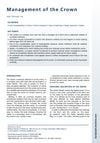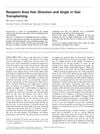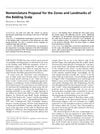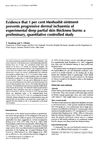 4 citations,
April 2020 in “Facial Plastic Surgery Clinics of North America”
4 citations,
April 2020 in “Facial Plastic Surgery Clinics of North America” Hair loss in women is complex to diagnose and treat, and hair restoration should be done by experts. Using minoxidil before surgery can help manage post-surgery hair shock loss. The Follicular Unit Transplantation method is recommended for women due to its speed, no need for shaving, and better graft quality. Strategies like L, T, and reverse L patterns can help restore central hair density, and regenerative methods can improve graft survival in hair transplants.
 2 citations,
August 2013 in “Facial Plastic Surgery Clinics of North America”
2 citations,
August 2013 in “Facial Plastic Surgery Clinics of North America” Treat the front and middle scalp before the vertex in hair transplants, aim for good density, use non-surgical options for young people, and customize treatment for natural results.
 1 citations,
November 2002 in “Neurosurgery Clinics of North America”
1 citations,
November 2002 in “Neurosurgery Clinics of North America” The article concludes that cranial reconstruction should aim for the best aesthetic result, using various techniques tailored to individual needs and conditions.
 June 2004 in “Dermatologic Surgery”
June 2004 in “Dermatologic Surgery” Dr. Walter P. Unger suggests that copying a person's natural hair direction and angle during transplants leads to a more natural and fuller appearance.
 April 2001 in “Dermatologic Surgery”
April 2001 in “Dermatologic Surgery” Michael L. Beehner proposed a standardized naming system for balding scalp areas to help hair restoration surgery.

Meshushit ointment helps form thicker healing tissue and preserves hair follicles in burns.
 December 2016 in “Journal of Dermatology and Dermatologic Surgery”
December 2016 in “Journal of Dermatology and Dermatologic Surgery” IFHUT shows better hair growth than FUE, but needs improvements in positioning, speed, and accuracy.
8 citations,
October 2021 in “The international journal of risk and safety in medicine” The document sets criteria for diagnosing long-term sexual dysfunctions caused by certain medications.
 3 citations,
January 2021 in “Plastic and Aesthetic Research”
3 citations,
January 2021 in “Plastic and Aesthetic Research” Hair loss reduces hair thickness and coverage, but drug treatments mainly revive dormant hairs rather than reverse thinning; patients often undervalue their hair loss severity.
 10 citations,
July 2021 in “International Journal of Rheumatic Diseases”
10 citations,
July 2021 in “International Journal of Rheumatic Diseases” Lupus patients' body image issues significantly affect their mental health and need more support.
 5 citations,
April 2007 in “Popular Communication”
5 citations,
April 2007 in “Popular Communication” Makeover TV shows promote unrealistic beauty standards and pressure women to conform to societal ideals.
 2 citations,
November 2017 in “The American Journal of Cosmetic Surgery”
2 citations,
November 2017 in “The American Journal of Cosmetic Surgery” Using a wall mirror to design the hairline in hair restoration surgery is simple, cheap, and effective for natural-looking results.
 6 citations,
September 2017 in “Journal of health psychology”
6 citations,
September 2017 in “Journal of health psychology” Women who had cancer treatment feel both positive and negative about their bodies.
 17 citations,
January 2007 in “Popular Communication”
17 citations,
January 2007 in “Popular Communication” Makeover TV shows promote unrealistic beauty standards and suggest women's worth is based on looks.
 4 citations,
September 2016 in “Journal der Deutschen Dermatologischen Gesellschaft”
4 citations,
September 2016 in “Journal der Deutschen Dermatologischen Gesellschaft” Some skin patients have body image issues linked to social difficulties but want psychological help.
 3 citations,
December 2003 in “University of California Press eBooks”
3 citations,
December 2003 in “University of California Press eBooks” Media images promote unrealistic beauty standards, affecting body image and eating disorders globally.
 138 citations,
March 2001 in “Clinics in Dermatology”
138 citations,
March 2001 in “Clinics in Dermatology” Hair loss can significantly affect a person's self-esteem and body image, especially in young people, those who value their looks highly, and women.
 June 2000 in “British Journal of Clinical Psychology”
June 2000 in “British Journal of Clinical Psychology” The reviews critique three psychology books, noting skepticism about a personality inventory for teens, praising a practical guide on body image issues, and recommending a book on grief therapy.
 192 citations,
June 1992 in “Journal of The American Academy of Dermatology”
192 citations,
June 1992 in “Journal of The American Academy of Dermatology” Hair loss can cause low self-esteem, anxiety, and depression in men.
 180 citations,
September 1999 in “British Journal of Dermatology”
180 citations,
September 1999 in “British Journal of Dermatology” Hair loss affects self-esteem and quality of life; treatments can help.
 19 citations,
July 2020 in “Journal of cancer survivorship”
19 citations,
July 2020 in “Journal of cancer survivorship” People undergoing chemotherapy need better support and information to cope with hair loss.
 2 citations,
September 2012 in “Actas Dermo-Sifiliográficas”
2 citations,
September 2012 in “Actas Dermo-Sifiliográficas” Societal pressure for the perfect body leads to health risks and disorders.
 1 citations,
October 1984 in “Clinics in dermatology”
1 citations,
October 1984 in “Clinics in dermatology” People distressed by minor skin changes should consult dermatologists with cosmetic expertise, and a public Cosmetic Dermatology Service with mental health support is recommended.
 November 1999 in “Australian Psychologist”
November 1999 in “Australian Psychologist” The reviews highlighted practical advice and insights from various psychology and therapy books.
 9 citations,
February 2016 in “Cambridge University Press eBooks”
9 citations,
February 2016 in “Cambridge University Press eBooks” The conclusion is that self-concept, shame, and emotion regulation are key factors in hoarding disorder, body dysmorphic disorder, and trichotillomania, and should be targeted in treatment and research.
 2 citations,
April 2021 in “Cureus”
2 citations,
April 2021 in “Cureus” Two new reliable Arabic questionnaires for measuring quality of life in women with PCOS were created, one for married and one for unmarried women.
21 citations,
July 2004 in “Apmis” Fluorescent proteins help visualize and understand tumor blood vessel growth.
 21 citations,
August 2011 in “Body Image”
21 citations,
August 2011 in “Body Image” Acceptance reduces hair loss distress and medical consultations; coping mechanisms increase them.
 August 2023 in “International Ayurvedic medical journal”
August 2023 in “International Ayurvedic medical journal” Improper diet, lifestyle, and stress are major causes of hair fall.
 49 citations,
November 1992 in “Archives of dermatology”
49 citations,
November 1992 in “Archives of dermatology” Different treatments for alopecia areata have varying success rates and side effects; intralesional steroids are most effective.



























